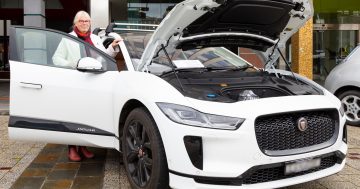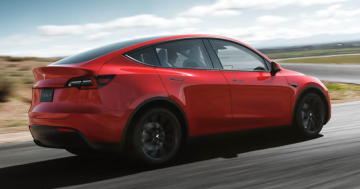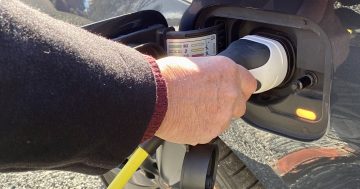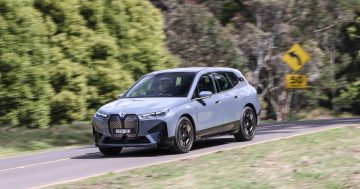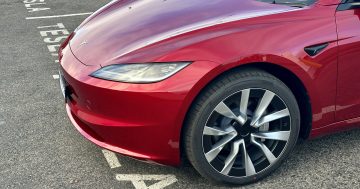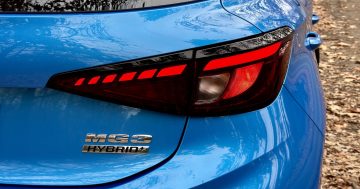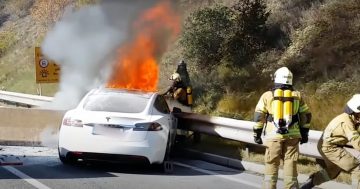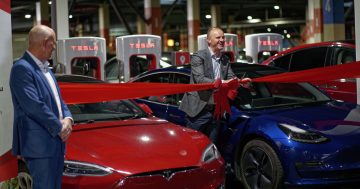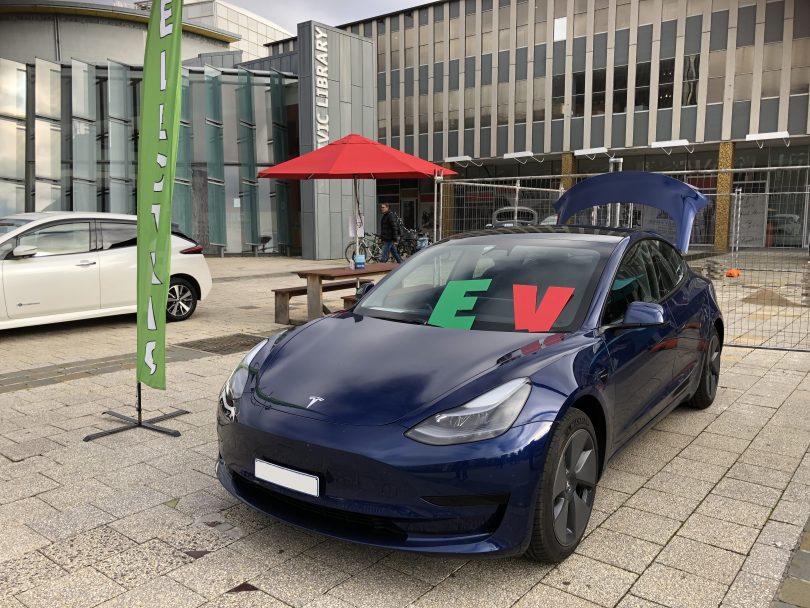
The Model 3, the entry-level Tesla. Photo: James Coleman.
“It’s cool – and nice to know that there are 1000 out there on Canberra roads.”
A Tesla Model 3 belonging to Peter McNeil made history last month as the 1,000th EV registered in the ACT.
So far, zero-emission vehicles account for 0.37 per cent of total vehicles in the territory this year and include cars powered by on-board batteries and hydrogen fuel cells. It’s still a tiny figure but one that is on the rise. Between 2019 and 2020 the number nearly doubled
“I didn’t want to buy another petrol car so I looked at all the EVs and decided on the Tesla,” Peter said.
Teslas make up nearly half of all the EVs in the ACT followed by the Nissan Leaf and the Hyundai Kona Electric and IONIQ Electric duo.
“Rebates and schemes certainly helped bring the cost down. Thirteen years ago when I bought my last car, I said to myself that it would be the last internal-combustion car I was going to buy because I thought electric cars would come in sooner. The Tesla came in around $70,000 which was a good $20K more than I wanted to pay but it’s worth it.”
The ACT Government has brought various incentives to the table over the years, hoping to win over those who are still using fossil fuel powered vehicles.
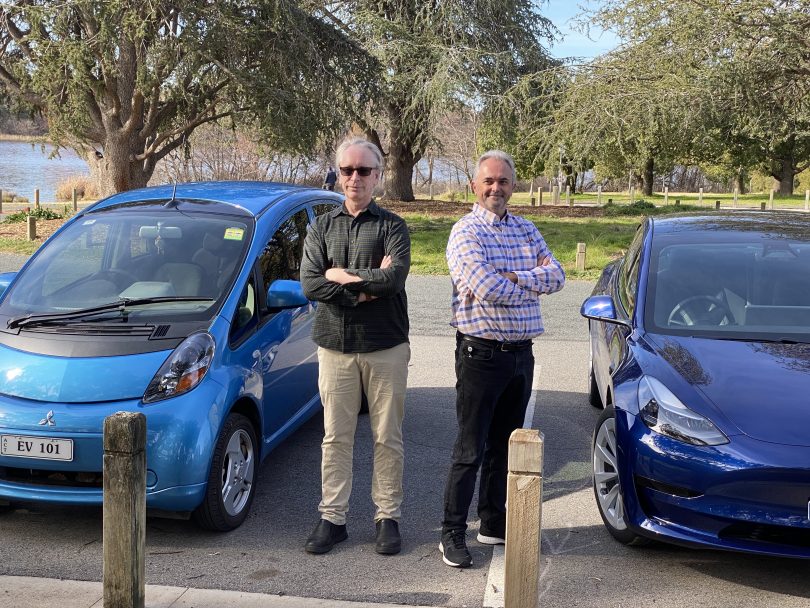
Karl and Peter proudly standing by their EVs. Photo: Supplied.
It started in June 2015 when buyers of EVs no longer had to pay stamp duty. Then in November 2018, the Government announced that all of the vehicles in their fleet going forward would be EVs. In March 2019, EVs were granted the ‘privilege’ of being able to drive along in the transit lane on Adelaide Avenue. Most recently, brand new EVs bought from May this year will receive free registration for two years.
A massive hail storm in January 2019 also forced many into the new car market and people who had been content with fossil fuel powered cars until that point began investigating in the growing EV options.
Peter still has his old car and said that whenever he gets back in it for a drive, he truly realises just how far EVs have come.
“The Tesla is truly fantastic to drive. Certainly for anyone who likes to put their foot down, they would be absolutely hooked by the Tesla. If anything, it’s probably a little too fast, but it’s really smooth and really easy to drive. It’s fantastic in stop-start traffic and it’s really comfortable.”
“I chose this one because it has a sticker range of about 500 km. We need to get down to my parents’ place in south-western New South Wales and this car will easily do that, although we haven’t had a chance to do that yet. We’ve done some small trips out to Bungdendore and back and a few other places.”
Almost 10 years earlier, the honour of the first EV registered in the ACT belongs to Karl Goiser and his Mitsubishi i-MiEV, with the very appropriate number plate of “EV101”.
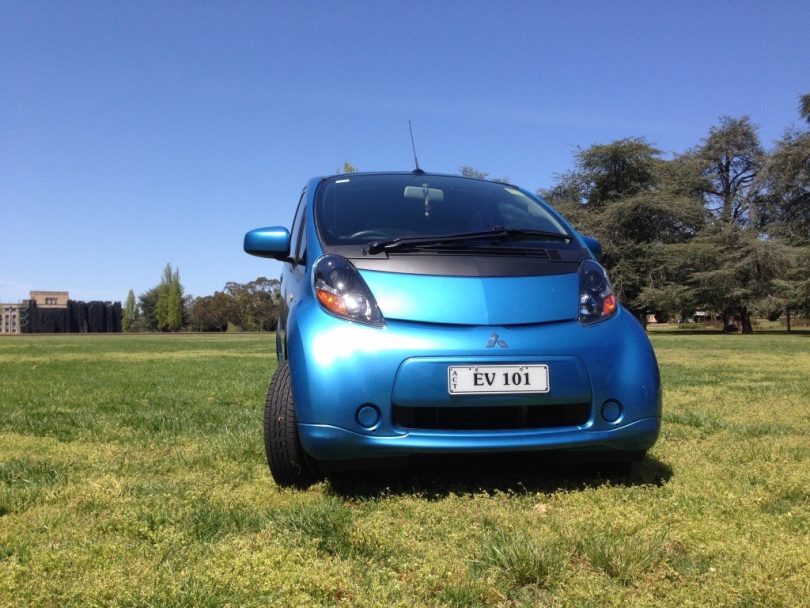
The first electric vehicle registered in the ACT was a 2011 Mitsubishi i-MiEV. Photo: Karl Gosier.
Karl describes it as “very unusual” in those early days to see another electric car.
“When I bought the Mitsubishi in September 2011, you couldn’t buy an electric car apart from this one and the Nissan Leaf. People were very much against them.”
Karl said he’s always been interested in “electrical stuff” and the idea of having a car that is propelled by an electric motor and batteries was a fascinating thing for him.
“Now, thank goodness, I see an EV nearly every time I get out and drive around Canberra. The incentives that the ACT Government are giving are absolutely brilliant and should be carried out across the whole of Australia. Burning fossil fuels is a very important thing to move away from.”
He admits the range he gets from the aging hatchback isn’t great.
“It’s old. It has the same battery technology as your laptop, and the battery wears out over time. But I only use it inside Canberra and it does the shopping and everything I need to do in the city. I plug it in when I get home and it’s fully charged in the morning.”
For other duties, he exchanged his petrol car last year for the Hyundai Kona Electric which offers a more useable 400 kilometre range.
“It makes me very sad to know that there are about 200 models of EV available worldwide and about 12 in Australia. Manufacturers are very reluctant to bring their cars in because they know that the federal Government doesn’t support them.”












